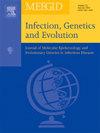2024年巴基斯坦流行登革热病毒的基因组特征和血清型分布
IF 2.6
4区 医学
Q3 INFECTIOUS DISEASES
引用次数: 0
摘要
登革热病毒(DENV)在巴基斯坦仍然是一个重大的公共卫生问题,反复暴发需要持续的基因组监测。2024年登革热疫情促使对流行血清型和基因组多样性进行调查。巴基斯坦国家卫生研究所(NIH)于2024年在多个地区收到524份NS-1登革热确诊样本。在388份阳性样本中,实时聚合酶链反应(real-time PCR)血清分型证实DENV-2的占93% (n = 361), DENV-1的占7% (n = 27),未发现合并感染。男性占65%,平均年龄30.78±15.03岁。使用Illumina MiSeq进行宏基因组测序获得了33个成功的DENV基因组(DENV- 2:23; DENV- 1:10),包括Chilas和Kech的首次报告。系统发育分析显示,2024年DENV-1(基因型III)和DENV-2(世界基因型,进化支IV-A/2II_F.1.1)与2022-2023年巴基斯坦菌株非常相似(同源性约99%)。时间尺度分析估计,2018年23个DENV-2序列中有22个具有最近的共同祖先(MRCA),而一个分化菌株(NIHPAK-246)可追溯到2005年。来自Kech的DENV-2菌株与拉瓦尔品第菌株具有99.8%的相似性,表明存在传播联系。DENV-1序列在2016年共享MRCA,表明持续循环。突变分析发现,来自Chilas的DENV-1基因中存在NS4B: G240S,可能存在局部适应。这些发现强调了在巴基斯坦进行持续的基因组监测、监测传播动态和有针对性的公共卫生干预的必要性。本文章由计算机程序翻译,如有差异,请以英文原文为准。
Genomic characterization and serotype distribution of dengue virus circulating in Pakistan during 2024
Dengue virus (DENV) remains a significant public health concern in Pakistan, with recurrent outbreaks necessitating continuous genomic surveillance. The 2024 dengue outbreak prompted an investigation into circulating serotypes and genomic diversity. The National Institute of Health (NIH), Pakistan, received 524 NS-1 confirmed dengue samples across multiple districts in 2024. Serotyping via real-time PCR confirmed DENV-2 in 93 % (n = 361) and DENV-1 in 7 % (n = 27) of 388 positive samples, with no co-infections detected. Males accounted for 65 % of cases, with a mean age of 30.78 ± 15.03 years. Metagenomic sequencing using Illumina MiSeq yielded 33 successful DENV genomes (DENV-2: 23; DENV-1: 10), including the first reports from Chilas and Kech. Phylogenetic analysis showed 2024 DENV-1 (genotype III) and DENV-2 (Cosmopolitan genotype, clade IV-A/2II_F.1.1) closely resembling 2022–2023 Pakistani strains (∼99 % homology). Time-scaled analysis estimated 22 of 23 DENV-2 sequences shared a most recent common ancestor (MRCA) in 2018, while a divergent strain (NIHPAK-246) traced back to 2005. DENV-2 strains from Kech exhibited >99.8 % similarity with Rawalpindi strains, suggesting transmission links. DENV-1 sequences shared an MRCA in 2016, indicating sustained circulation. Mutation analysis identified NS4B: G240S in DENV-1 from Chilas, suggesting localized adaptation. These findings highlight the need for sustained genomic surveillance, monitoring transmission dynamics, and targeted public health interventions in Pakistan.
求助全文
通过发布文献求助,成功后即可免费获取论文全文。
去求助
来源期刊

Infection Genetics and Evolution
医学-传染病学
CiteScore
8.40
自引率
0.00%
发文量
215
审稿时长
82 days
期刊介绍:
(aka Journal of Molecular Epidemiology and Evolutionary Genetics of Infectious Diseases -- MEEGID)
Infectious diseases constitute one of the main challenges to medical science in the coming century. The impressive development of molecular megatechnologies and of bioinformatics have greatly increased our knowledge of the evolution, transmission and pathogenicity of infectious diseases. Research has shown that host susceptibility to many infectious diseases has a genetic basis. Furthermore, much is now known on the molecular epidemiology, evolution and virulence of pathogenic agents, as well as their resistance to drugs, vaccines, and antibiotics. Equally, research on the genetics of disease vectors has greatly improved our understanding of their systematics, has increased our capacity to identify target populations for control or intervention, and has provided detailed information on the mechanisms of insecticide resistance.
However, the genetics and evolutionary biology of hosts, pathogens and vectors have tended to develop as three separate fields of research. This artificial compartmentalisation is of concern due to our growing appreciation of the strong co-evolutionary interactions among hosts, pathogens and vectors.
Infection, Genetics and Evolution and its companion congress [MEEGID](http://www.meegidconference.com/) (for Molecular Epidemiology and Evolutionary Genetics of Infectious Diseases) are the main forum acting for the cross-fertilization between evolutionary science and biomedical research on infectious diseases.
Infection, Genetics and Evolution is the only journal that welcomes articles dealing with the genetics and evolutionary biology of hosts, pathogens and vectors, and coevolution processes among them in relation to infection and disease manifestation. All infectious models enter the scope of the journal, including pathogens of humans, animals and plants, either parasites, fungi, bacteria, viruses or prions. The journal welcomes articles dealing with genetics, population genetics, genomics, postgenomics, gene expression, evolutionary biology, population dynamics, mathematical modeling and bioinformatics. We also provide many author benefits, such as free PDFs, a liberal copyright policy, special discounts on Elsevier publications and much more. Please click here for more information on our author services .
 求助内容:
求助内容: 应助结果提醒方式:
应助结果提醒方式:


